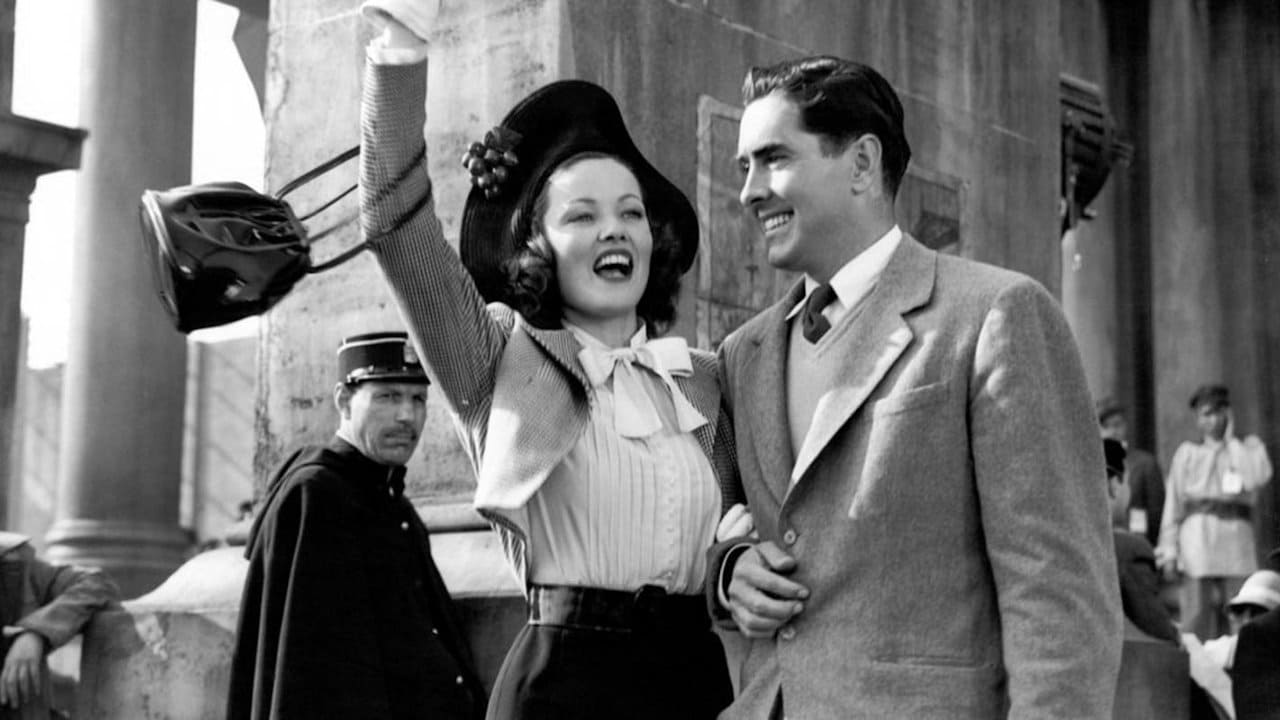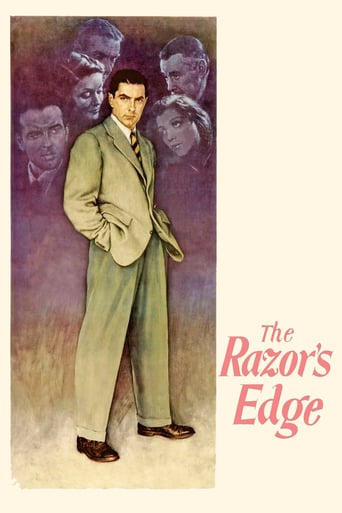

And that, first of all due to the quality of the actors' play, all of them are very good: Tyrone Power, Gene Tierney, Anne Baxter, Clifton Webb, Herbert Marshall, especially the magnificent director Edmund Goulding and the very exciting script. The film has a special atmosphere and extraordinary group scenes. A unique love story.
... View MoreLarry Darrell (Tyrone Power) returns home from World War I not sure what to do with his life, except that he doesn't want to work and marry just yet. He breaks off his engagement with his socialite fiancée Isabel (Gene Tierney) and travels the world seeking some answers to life's questions. While in India, he achieves some degree of enlightenment and also discovers a way to cure headaches! When he returns, Isabel has married another man (John Payne). Also his childhood friend Sophie (Anne Baxter) has lost her husband and child in an accident and has become a drunk living in a seedy part of town. Larry sets out to help Sophie but jealous Isabel doesn't take kindly to this.Thoughtful adaptation of the W. Somerset Maugham story. Maugham appears as a character in the film, wonderfully played by Herbert Marshall. Power and Tierney offer solid performances. But the real stars are the supporting duo of Anne Baxter and Clifton Webb. Baxter won a Best Supporting Actress Oscar. Webb was nominated but did not win against stiff competition. He's fantastic though. Baxter gives possibly the best performance of her career. Despite the length, I never felt bored. It's an excellent movie. A little pretentious perhaps but much less so than many similarly-themed dramas made in the last few decades. The 1984 remake doesn't hold a candle to this, by the way.
... View MoreOld Hollywood was always in trouble when dealing with Deep Think. That's because of the medium's commercial nature. When flirting with spiritual or religious beliefs, the studios simply didn't want to risk offending potential ticket buyers. So, when dealing with Deep Think (not their many biblical epics which were unabashedly Christian), the studios compromised to the point of absurdity by either flattening out the message or trivializing it. Here it's trivialized. After all, who's against Goodness. As a result, we wait 145-minutes to find out that, yes, Goodness is in fact a good and noble thing, and with that, Larry (Power) is on his way to enlightenment. And naturally, no one's offended, except maybe those who had expected something more.Of course, the profundity is wrapped in lavishly mounted studio soap opera, with two of Hollywood's most beautiful people surrounded by whirling hosts of well-clothed extras. In fact, that opening ballroom scene is a marvel of orchestrated staging as the characters are introduced by serially playing off one another. At the spectrum's other end, however, is that dreadful monastery scene with its painted mountain backdrop and facile dialog. Flattening the import of that pivotal scene are the repeated references to god as though that's where all paths must inevitably lead. And that's along with the spectacular alpine vistas fairly shouting celestial light from a heavenly above. I'm sure all that window dressing comforted nervous audiences who could then wink at Larry's spiritual quest and not feel the least bit threatened. But it also reduced a profound subject to a superficial level.Another area that gets a Hollywood treatment are values and class, always tricky topics for an industry backed by Wall Street. The movie goes to pains circulating Larry among the gilded elite of Chicago as epitomized by the petulantly snobbish Templeton (Webb) and the selfishly insulated Isabel (Tierney). But, the elite's values are clearly materialistic, a spiritual dead-end in Larry's view as he heads off to learn from suffering with the working class. The screenplay thus sets up an implicit critique of the gilded class and the values that guide them. Well and good. But then the screenwriters can't seem to decide what to do with this point of view; after all, that's another touchy topic among audiences, especially coming so soon after the societal upheaval of the 1930's.As a result, Larry never really criticizes the peer group he's been a part of, never really explains, that is, why he sees his social class as a spiritual dead-end, which of course would delve into a socially touchy subject. Nor, for that matter, does Larry explain why "salvation" lies through sharing a working class experience. We're left, I guess, to suppose the answer has to do with the suffering caused by hard physical labor and poor pay this class must endure. This subtext, however, is never really brought to the surface and remains unresolved at movie's end. Thus, big studio TCF and its head honcho, producer Zanuck, nibble around a second tinderbox topic, tantalizing us but never really delivering.The movie does have a definite upside. For one, it's exquisitely well photographed, compensating somewhat for the 2-hour-plus run time. At the same time, the ballroom scenes are especially well choreographed and lavishly upholstered, creating an impressive air of wealth and breeding that makes Larry's renunciation a genuine material sacrifice. Then too, there's Webb's lively version of an unregenerate snob, a character he could do to waspish perfection. Also, Marshall's quietly observant author provides a needed contemplative note. However, in the film's pivotal role Power fails to provide the needed depth his character requires, or as another reviewer observes, Larry is pretty much the same after his trip to India as he was before. Fortunately, Power would later find that depth in Nightmare Alley (1947).All in all, the movie remains an overlong visual treat that fortunately includes the exquisite Tierney. But as one might expect from old Hollywood, the film fails crucially at coming to grips with its two overriding themes—spirituality and class. As a result, two of life's most important questions are given unchallenging treatment. In short, here as elsewhere, where Deep Think is concerned, commercialism precedes all else.
... View MoreThis is a BIG Hollywood PRODUCTION. It must be Big because it deals with Big Ideas. And it's long too, very long. And it has 20th-Century Foxes most scintillating troopers doing their things. Also it must be big because, if I remember, there was a monstrous billboard advertising it over one of the theaters near Times Square. "The Razor's Edge," proclaimed the billboard -- in Big Letters. Starting next week: The Second Coming.Actually it's kind of an interesting story, full of romance, intrigues, slight conflicts -- all very dignified and full of civility, as Somerset Maugham's works tended to be. He was always understated in a British manner. When he was in the fullness of his years he gave a presentation on aging. "There are many advantages to being old," he said from the stage, and then stopped. There was a long pause. Too long. The stooped old Maugham stood still at the platform until the audience began to cough and squirm. Finally he spoke up: "I'm just trying to remember what they are." I don't think I want to try outlining the plot because it would begin to sound a little like a Russian novel. Basically, Tyrone Power returns from World War One. (Kids: That was the one before World War Two. PS: We won.) He's seen a lot of death and he asks his fiancée, Gene Tierney, out loud, "What's it all about?" It's always a poor idea to ask a question like this but in Power's case his search for an answer leads him to India, and although he loses his fiancée he gains a mystic experience.The rest of the movie, which is to say most of it, is taken up with a gaggle of Americans in Paris and other parts of France. They keep bumping into one another. Let's see. There is Tierney, of course. She's a materialist and after Power takes off she marries the rich, blandly handsome, slightly weak John Payne. She never stops loving Power in her own bitchy way. Then there is Anne Baxter, whom Power has known since childhood as a true innocent. A car accident kills her husband and children and she becomes a drunk and a whore in some gin mill where Apache dancers perform. Then there is Clifton Webb as the rich, snooty, but not inhuman uncle of Tierney. Finally there is Herbert Marshall, playing Maugham himself, who drifts in and out of the narrative as a sort of sympathetic flaneur.Over a span of more than ten years, a couple of the characters die, some "find themselves," others are disappointed and guilt ridden, and Power carries on secure in his knowledge of self -- a good, kind man.Frankly I didn't notice much difference between pre- and post-epiphany Power, except that after he felt God in a Himalayan sunrise he stopped asking what it was all about. I've always had trouble with mystic experiences, though I studied Eastern psychology and meditation in graduate school. I've experienced what might be called "awe" but never when I sought it and never in the presence of other people. But maybe it IS all an illusion and some cosmic force is behind it all. I once observed what was undoubtedly a UFO that defied the kind of physical laws we take for granted. My mind remains open, and I'll give Tyrone Power his mystic experience, though I wish the rest of his life hadn't led him into such difficulties. He never does explain exactly how his experience improved his life or, indeed, changed it in any way. Possibly the experience itself is indescribably and transcends language.The performances are all about what we'd expect from a cast of seasoned professionals. Anne Baxter, in particular, must have been a brave young lady because make up and wardrobe have turned her into a dumpy sloven. That takes guts. It may be the role into which Gene Tierney put most effort. It's a variation on her murderous narcissist in "Leave Her to Heaven," but more candid, more defiantly selfish. Clifton Webb was an aristocratic flit in "Laura," two years earlier, but here he seems to come brazenly out of the closet and it's amusing as hell.It's a masterpiece of middlebrow movie making. It ought to set most of us thinking. Here's one of the things we might wind up ruminating. In praise of the new Power, Herbert Marshall says something like, "He's a good man -- kind, gentle, forgiving." Is that today's idea of a good man?
... View More